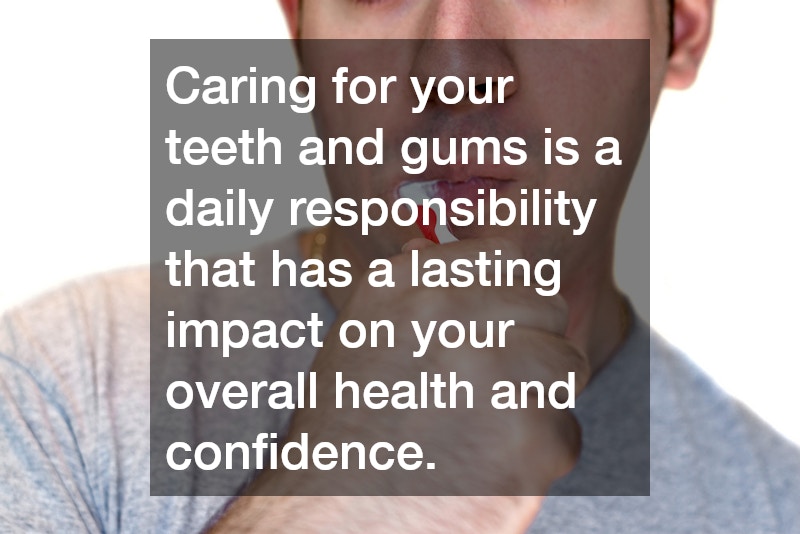Maintaining oral health is a lifelong commitment that extends well beyond the dentist’s chair. While regular dental check-ups are essential for preventing serious issues, what you do between visits plays a critical role in ensuring your teeth and gums remain in top condition. With the right habits and a consistent approach, you can keep your smile healthy and bright, reduce the risk of gum disease and potentially minimise the amount of dental work you need in the future.
Here’s how to take excellent care of your oral health in everyday life.
Brush Properly & Regularly
Brushing twice a day might seem like common sense, but how you brush is just as important as how often. A rushed job or incorrect technique can leave behind plaque and food debris, which can lead to cavities and gum inflammation. Take the time to brush gently in circular motions, angling the toothbrush toward the gum line. This helps remove bacteria without causing damage to your gums or enamel. Using a fluoride toothpaste strengthens tooth enamel and provides essential protection against decay. Aim to spend at least two minutes brushing to ensure thorough coverage of all tooth surfaces.
Electric toothbrushes are particularly effective at reducing plaque compared to manual brushes. They also often come with built-in timers to help ensure you’re brushing for the right duration. Regardless of which type you use, replacing your toothbrush head every three months—or sooner if the bristles fray—is essential for optimal hygiene.
Don’t Neglect Flossing
Flossing is often overlooked, yet it plays a vital role in oral hygiene. It removes plaque and food particles from between the teeth and beneath the gum line—areas a toothbrush can’t reach. When done properly, flossing can help prevent cavities and gum disease by keeping these tight spaces clean.
Many people find traditional flossing cumbersome, but alternative tools such as floss picks, interdental brushes or water flossers can be just as effective and easier to use. The key is consistency. Make flossing a daily habit to support your oral health between visits to the dentist.
Watch Your Diet for Dental Health
What you eat has a profound impact on your teeth. Sugary snacks, acidic beverages and sticky foods contribute to tooth decay by feeding harmful bacteria in the mouth. These bacteria produce acids that erode enamel and can lead to cavities. Limiting sugary drinks, avoiding frequent snacking and choosing healthier options like fresh vegetables, cheese and water can protect your teeth from damage.
Calcium-rich foods such as dairy products, almonds and leafy greens help maintain strong teeth, while phosphorus-rich foods like fish and eggs can also contribute to a resilient smile. Drinking plenty of water throughout the day helps wash away food particles and supports saliva production, which plays a natural role in neutralising acids and maintaining oral balance.
Avoid Tobacco & Limit Alcohol
Tobacco use is one of the most harmful habits for oral health. Smoking or chewing tobacco significantly increases the risk of gum disease, tooth loss and oral cancer. Additionally, tobacco stains teeth and contributes to persistent bad breath. If you’re using tobacco products, consider speaking to your GP about strategies to help you quit.
Alcohol can also negatively impact oral health by drying out the mouth, which reduces saliva production and increases the risk of decay and infection. Some alcoholic beverages are highly acidic or contain added sugars, both of which can damage tooth enamel over time. Moderation and mindful choices are key to reducing their impact.
Stay Consistent with Preventive Care
Consistency is the cornerstone of effective oral health care. Establishing a reliable daily routine that includes brushing, flossing and rinsing with an antibacterial mouthwash can keep your teeth clean and your gums healthy. Mouthwash helps reduce bacteria, freshens breath and can reach areas that brushing and flossing miss.
In addition to daily habits, being attentive to changes in your mouth is important. If you notice bleeding gums, persistent bad breath, tooth sensitivity or any discomfort, don’t wait until your next scheduled dentist appointment. Early intervention can prevent minor issues from becoming major problems.
Use the Right Oral Health Products
Choosing the right dental care products can make a difference in your overall oral hygiene. Not all toothpastes, toothbrushes or mouthwashes are created equal. Look for items that carry the Australian Dental Association (ADA) Seal of Approval, which indicates that the product meets high standards for safety and effectiveness.
Fluoride toothpaste, soft-bristled toothbrushes and alcohol-free mouthwashes are typically recommended by dental professionals. If you have specific concerns, such as sensitivity, dry mouth or a high risk of cavities, ask your dentist for personalised product recommendations suited to your needs.
Keep Your Smile Strong Between Dental Visits
Caring for your teeth and gums is a daily responsibility that has a lasting impact on your overall health and confidence. While professional dental care remains crucial, your at-home efforts are what sustain long-term oral wellness. Brushing with proper technique, flossing daily, making smart dietary choices, avoiding harmful substances and using dentist-approved products all contribute to a healthier mouth. By committing to these habits between appointments, you can ensure that every visit to the dentist is a proactive step in maintaining a bright and healthy smile.
.

